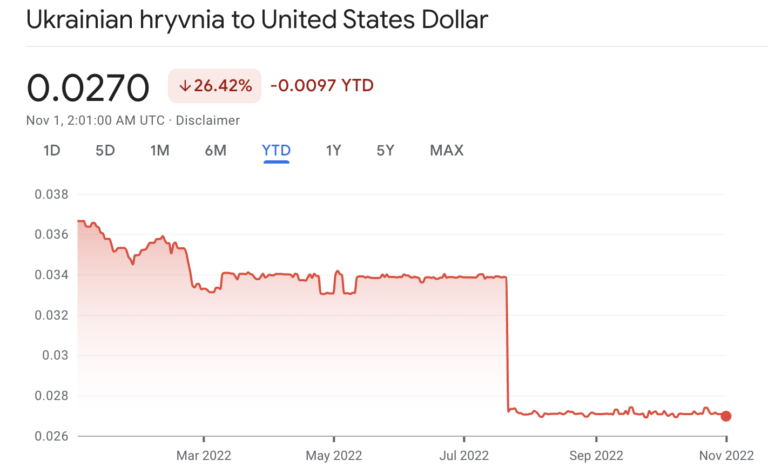
By: Robert Bisewski
robert.bisewski@thinklogicly.com

In February of this year, the world turned upside for the people of Ukraine.
The invasion of their country by Russia has prompted more than 7.6 million refugees to flee Ukraine, in an attempt to avoid wide-spread death and destruction.
It has also resulted in short-term food and oil shortages along with increased world-wide inflation. In addition, we have witnessed the largest emigration of Russian citizens since the days of Lenin, as people flee in anticipation of a likely greater mass mobilization in the future.
Suffice it to say, that this is a humanitarian crisis of catastrophic proportions, and it’s likely to get much worse before it gets any better.
Costly conflict for Ukraine’s currency
Most of the aforementioned above are well known to the general public.
Yet, one unappreciated, but vital concern for the Ukrainian society, is the collapse of Hryvnia, the main currency of the country.
At the start of 2022 it had traded at nearly 3.7 cents to the US dollar, but as of October of 2022, it is now at 2.7 cents. That’s a 30% reduction in value causing significant inflation and worsening the livelihood of people who remain in the country.

This has caused many foreign policy experts to recommend instituting more aid and economic assistance to prevent the complete breakdown of Ukraine’s economy.
According to an article by Foreign Policy, the current pace of losses means that Ukraine will shortly be on the verge of financial collapse if aid inflows are not sped up.
As the country’s foreign currency reserves are bleeding, it is a stark contrast to what Ukraine had hoped to accomplish with the establishment of the National Bank of Ukraine, which was to ensure Ukraine’s macro-financial stability and to facilitate a sustainable economic recovery.
Ukrainian economists believe that the reconstruction should be primarily financed by assets of the Russian state.
However, while NATO members debate what measures are needed to stabilize the monetary conditions of Ukraine, there are some whom are willing to take action to fill the more immediate needs.
Eliminating barriers and borders with FinTech
With people fleeing overseas to rebuild their lives, it often means that they are forced to figure out where they can find employment, so that they are able to better provide for their families.
Many in the FinTech industry have extended family and personal connections to Eastern Europe, including several employees here at LOGICLY, and so, the conflict weighs heavily on our minds.
One group seeking to make a difference is Fintech Without Frontiers. FWF is an organization that seeks to connect those who are displaced by the war with potential opportunities; helping them find jobs among the many Fintech companies that are looking to hire.
Huw Davies, FWF founder and Chief Commercial Officer of Ozone API, said: “FinTech aims to eliminate barriers and borders in terms of using financial products and help tackle challenges like financial inclusion.” A “united global FinTech front”, FWF continues to focus on helping fuel the growth of the Ukrainian economy by enabling international collaboration between FinTechs and talent across the globe.
Currently, more than 25 companies are a part of this organization.
Talk is cheap and action is worth millions
Others are seeking to help through fundraising, improving the digital infrastructure of monetary transfers, and better payment systems.
One such company being Tranzzo, which is an international platform for payments. They have developed solutions and technologies so that users can pay with their cards wherever they want. With this technology, Tranzzo was able to create the Diia payment app to help Ukrainian citizens inside and outside of the country in raising money for the armed forces.
While the premise itself is quite extraordinary, Rita Ochigava, CEO of Tranzzo, said that “the solution for the Diia app was created under rocket explosions, in shelters”.
Ukrainians raised more than $1 million for the needs of the Ukrainian military forces using the mobile app on launch day. With donations reaching more than $10 million, it pays to back promises with actions and the FinTech industry continuing with its fundraising and innovation efforts.
Picking up the pieces
Many small-to-medium businesses often find themselves dealing with “putting out fires” in the metaphorical sense, but for the Ukrainians involved in these projects, the threats are literal and the danger is real.
As the war continues to consume the lives of the people of Ukraine, it will have profound effects for many years to come. With some hoping that perhaps the conflict will be over sooner rather than later, so that people can rebuild and pick up the pieces.
In the meantime, the FinTech industry will continue to help wherever possible.
Enjoy reading this article? Other content you may find interesting:
- Getting paid…in Bitcoin?
- Deflation: A Different Kind of Deflate-gate
- A Friend Request from Your Advisor
- Cryptocurrency and the Rise of Custodied Assets
- The Future is Here: How Thematics is Disrupting Investing
- Women, Millennials, and Financial Planning
- How to Use One of Wall Street’s Best-Kept Secrets
To connect about media inquiries or to discuss the article, please email Robert at: robert.bisewski@thinklogicly.com

